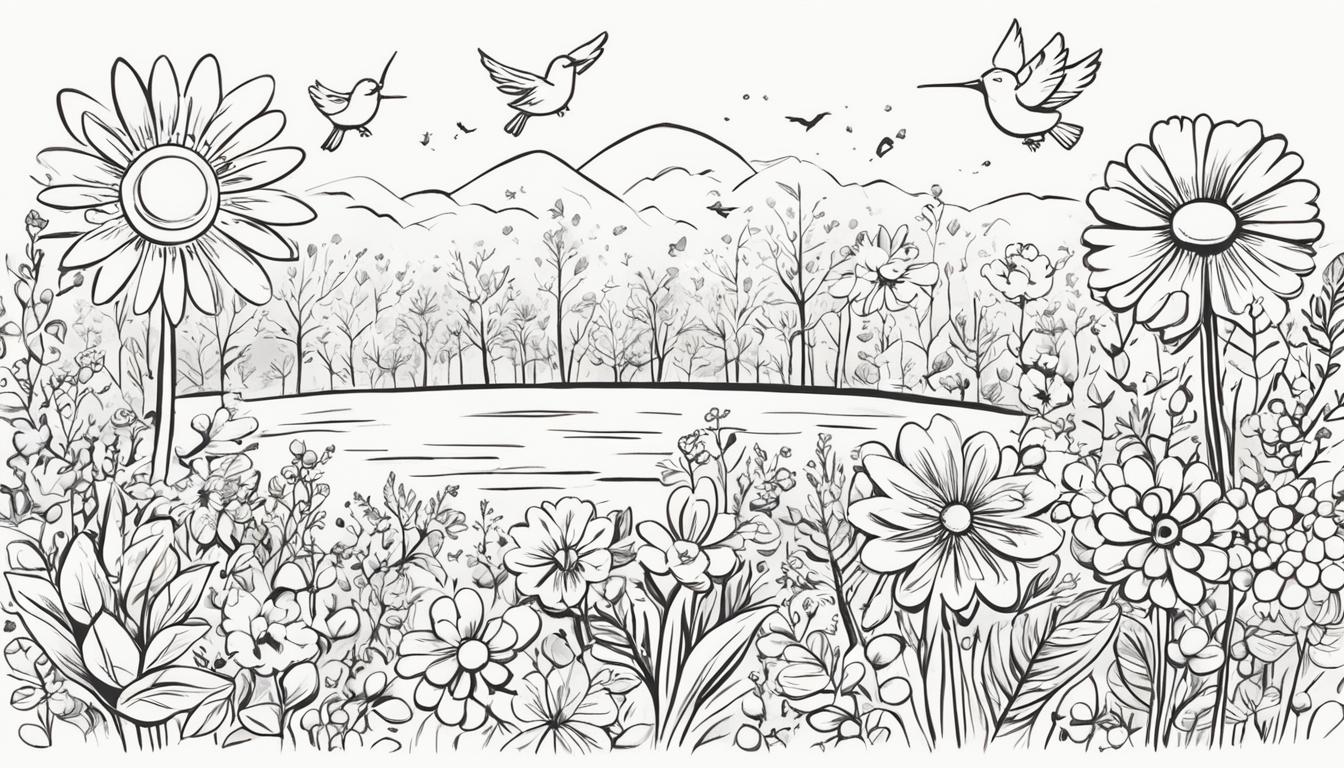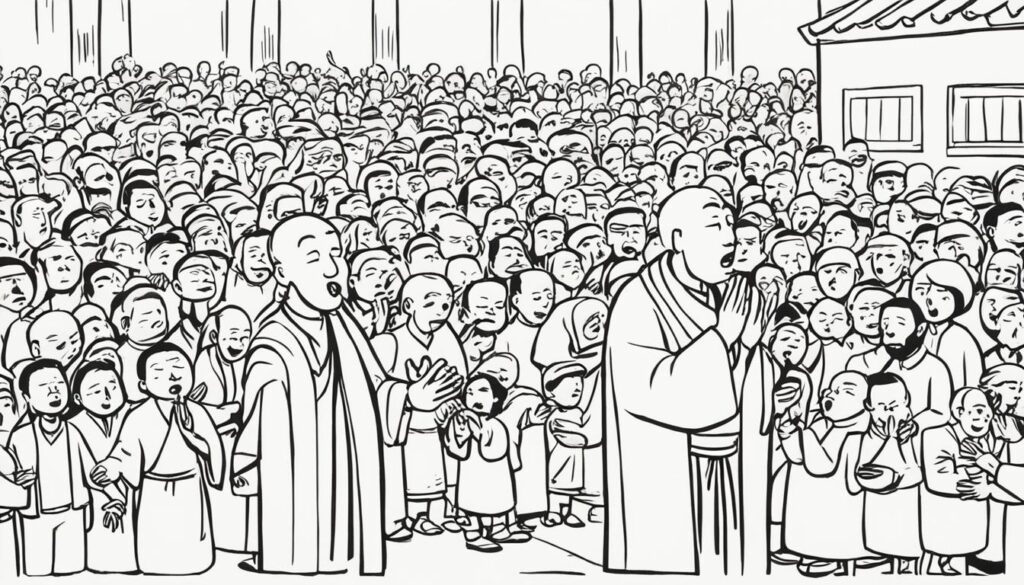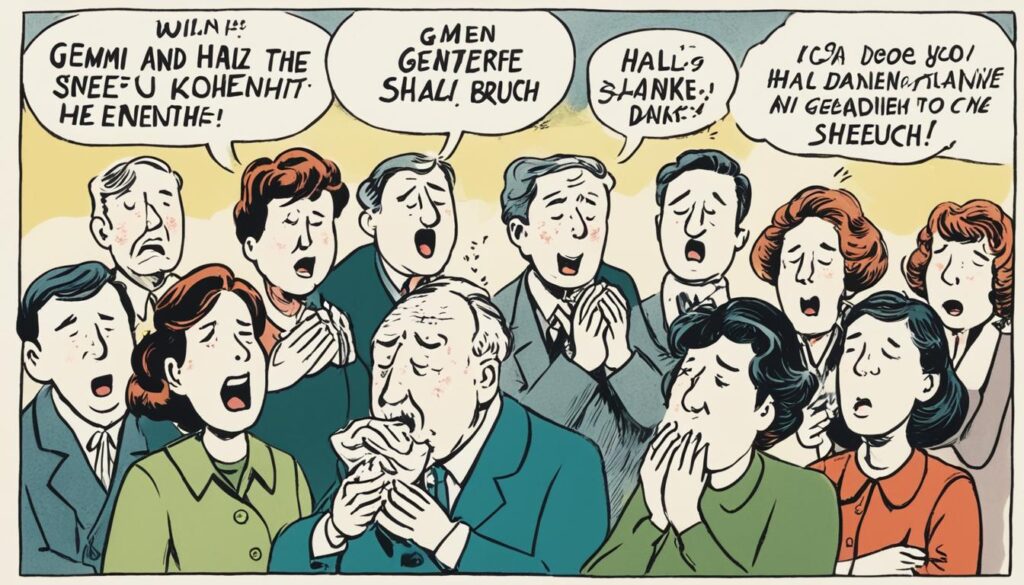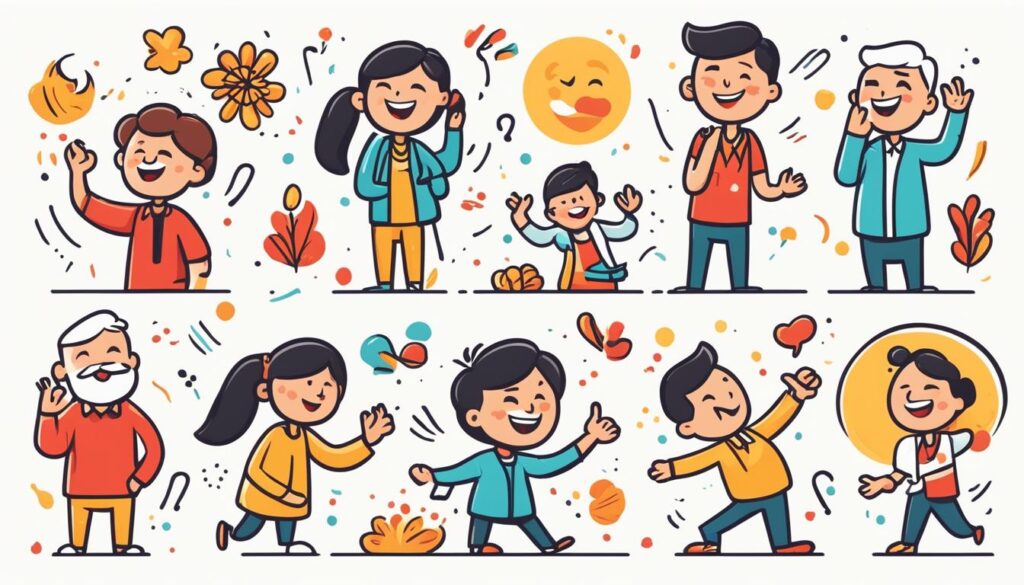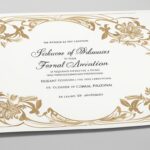Responses to a sneeze have been ingrained in our social fabric for centuries. In English-speaking countries, the automatic reply is often “bless you.” But what if I told you that there are alternative responses that can be just as polite and meaningful?
When someone sneezes, it is an invitation to acknowledge their momentary vulnerability and wish them well. It is an opportunity to show empathy and compassion in a seemingly small gesture. So, why not explore different responses that can add a touch of cultural flair to this commonplace exchange?
Key Takeaways:
- While “bless you” remains the common response in English-speaking countries, there are diverse alternatives in other languages.
- Various cultures have unique responses to sneezing that reflect their traditions and customs.
- Alternative responses convey good health, well wishes, and even playful banter.
- Exploring these alternatives can add cultural richness and broaden our perspective on the world.
- Embrace the opportunity to show empathy and compassion in even the simplest interactions.
Origins of Saying “Bless You” After a Sneeze
While the origins of saying “bless you” after a sneeze are uncertain, there are several theories that offer fascinating insights into this age-old tradition. Join me on a journey through history as we explore the mysterious beginnings of this polite response.
One theory suggests that the practice originated during the bubonic plague as a way to ward off illness. In the midst of a devastating pandemic, sneezing was often a symptom of the plague, so people believed that saying “bless you” would protect the sneezer from falling ill. By uttering this blessing, it was believed that one’s soul would be safeguarded from the lethal disease.
An alternate theory traces the tradition back to ancient Greece, where sneezing was believed to be a sign of the gods’ involvement in human affairs. The Greeks attributed sneezing to divine intervention and viewed it as an omen from the gods. They believed that saying “bless you” after a sneeze would express gratitude for the gods’ attention and invoke their protection.
Regardless of its historical origins, saying “bless you” has become deeply ingrained in the cultural fabric of many English-speaking countries. It has evolved into a customary social response, demonstrating politeness and concern for the well-being of others. The mere act of uttering these words after a sneeze reflects our innate instinct to offer comfort and good wishes.
| Theories on the Origins of Saying “Bless You” After a Sneeze |
|---|
| 1. Originated during the bubonic plague to ward off illness |
| 2. Traced back to ancient Greece as a sign of divine intervention |
As you can see, the origins of this simple yet meaningful phrase remain shrouded in uncertainty. Nevertheless, the act of saying “bless you” continues to bring comfort and connection to people across generations. It serves as a testament to our shared humanity and our desire to extend kindness in the face of life’s unexpected moments.
The figure above portrays the enigmatic origins of the phrase “bless you” after a sneeze.
Global Responses to Sneezing
When it comes to sneezing, different cultures have their own unique customs and responses. The way we acknowledge a sneeze varies widely across the globe, reflecting the rich tapestry of cultural traditions. In some non-English-speaking cultures, people use words or phrases that wish good health or long life instead of the common “bless you” response. In certain Asian countries such as Vietnam and China, it is customary to not respond at all. And in Arabic-speaking Muslim countries, people often praise Allah and wish for His mercy as a response to a sneeze.
These diverse responses reflect the customs and traditions deeply rooted in each culture, providing a fascinating glimpse into the rich tapestry of humanity’s customs and beliefs.
“A sneeze can bring us closer to the customs and beliefs of cultures around the world, reminding us of the beauty and diversity that surrounds us.”
Customs Across Continents:
Let’s explore some of the intriguing customs from different regions:
Asia:
In many Asian cultures, silence follows a sneeze. Responding to a sneeze is considered unnecessary and even distracting, as it disrupts the tranquility of the moment.
Arab-speaking Muslim countries:
In Arabic-speaking Muslim countries, after a sneeze, it is common to say “Alhamdulillah” (praise be to Allah) as a way of expressing gratitude for the sneezer’s well-being.
Europe:
In Europe, customs vary from country to country. For example, in Germany, the response to a sneeze is “Gesundheit,” which means “health.” While in France, people say “À tes souhaits” or “À vos souhaits,” meaning “to your wishes.” These traditions highlight the importance Europeans place on health and personal desires.
Africa:
In many African countries, sneezing is often considered a positive sign. It is believed that a sneeze expels evil spirits or negative energy from the body, inviting good luck and protection. No verbal response is typically given in these cultures.
Oceania:
In some Pacific Island cultures, such as Hawaii, sneezing is seen as a spiritual act. It is believed that when someone sneezes, their soul is temporarily separated from the body, and in response, people offer blessings or prayers for their well-being.
To better understand the global responses to sneezing, let’s take a look at the following table:
| Region | Response to Sneezing |
|---|---|
| Asia | Silence |
| Arab-speaking Muslim countries | Praise to Allah |
| Europe | “Gesundheit” (Germany) “À tes/vos souhaits” (France) |
| Africa | No verbal response |
| Oceania | Prayers or blessings |
As we can see, each region has its own unique response to sneezing, providing a captivating insight into the cultural tapestry that surrounds us. From silence to prayers and well wishes, these diverse customs exemplify the beauty of our interconnected world.
German: Gesundheit
In German culture, when someone sneezes, it is customary to respond with the word “Gesundheit,” which translates to “health” in English. This simple and concise response conveys well wishes for the sneezer’s good health, evoking a sense of care and concern.
Alternative to “Bless You” in German
Unlike the English phrase “bless you,” which has religious connotations, “Gesundheit” is a secular response that reflects the German culture’s emphasis on good health and wellbeing. It is also commonly used as an alternative to saying “bless you” in English-speaking countries, embracing the German tradition of prioritizing physical health.
“Gesundheit” encompasses not only the desire for immediate recovery but also a sincere wish for the sneezer’s ongoing well-being.”
Rather than invoking a religious blessing, the German response acknowledges the biological act of sneezing while extending kind thoughts and genuine concern for the person’s continued health.
| Language | Response to Sneeze |
|---|---|
| English | Bless You |
| German | Gesundheit |
| Spanish | Salud, Dinero, Amor |
| French | À Tes/Vos Souhaits |
| Turkish | Çok Yaşa, Sağlıklı Yaşa |
| Russian | Будьте здоровы |
| Dutch | Gezondheid, Morgen Mooi Weer |
Spanish: Salud, Dinero, Amor
In Spanish-speaking regions, there are different responses for each sneeze. After the first sneeze, the response is “salud,” which means “health.” After the second sneeze, the response is “dinero
After the third sneeze, the response is “amor,” which translates to “love.” This sequence of responses adds a playful element to the traditional blessings after sneezing.
| Sneeze | Response |
|---|---|
| First | Salud |
| Second | Dinero |
| Third | Amor |
French: À Tes/Vos Souhaits
In the world of sneezing, the French have their own unique way of responding. When someone sneezes, the common response in French is “à tes/vos souhaits,” which translates to “to your wishes.” It’s a beautiful and whimsical phrase that reflects the French culture’s emphasis on individual well-being and personal desires.
This response goes beyond simply wishing good health or offering blessings. Instead, it acknowledges the sneeze as a moment to honor the sneezer’s personal aspirations and dreams. It’s a poetic gesture that embraces the idea of each person’s unique path and the importance of their wishes coming true.
“à tes/vos souhaits”
This phrase is not only an alternative to saying “bless you,” but it also holds a deeper meaning. It reminds us that sneezing is not just a bodily reflex; it’s a moment of vulnerability and an opportunity to acknowledge the sneezer’s individuality.
In French culture, the response to a sneeze is not merely a reflex or a social convention. It’s an invitation to recognize and honor the dreams and desires of the person who sneezed. It’s a poetic reminder to embrace the beauty of individual aspirations and the power of personal wishes.
French Politeness and Customary Phrases
In France, politeness is highly valued, and the use of customary phrases is an integral part of daily interactions. From greetings to farewells, the French language is rich in expressions that foster a sense of connection and goodwill.
The phrase “à tes/vos souhaits” is one such expression. It carries with it the warmth and charm that are characteristic of French culture. By using this phrase, one not only acknowledges the sneeze but also extends good wishes and positive energy to the individual.
So, the next time you hear someone sneeze in France, remember to respond with a heartfelt “à tes/vos souhaits” and embrace the opportunity to honor their wishes, dreams, and aspirations.
Continue reading to discover more fascinating responses to sneezing from around the world.
Turkish: Çok Yaşa, Sağlıklı Yaşa
In Turkey, when someone sneezes, we have a unique way of responding that goes beyond wishing good health. After the first sneeze, we say “çok yaşa,” which means “live long.” It’s a heartfelt wish for a long and fulfilling life.
But that’s not all. After the second sneeze, our response takes it a step further. We say “sağlıklı yaşa,” which translates to “live healthy.” It’s a reminder to take care of oneself and prioritize good health. After all, what is a long life without good health?
But what makes our sneeze response truly special is the sneezer’s playful reply. Instead of a traditional thank you, we add a lighthearted twist. The sneezer responds with “and I hope you will be there to see it.” It’s a delightful way to acknowledge the well-wishes and involve the responder in the sneezer’s long and healthy life.
In Turkish culture, expressing good wishes and genuine concern for others is deeply ingrained. Our response to a sneeze reflects our desire for others to lead long, healthy lives filled with happiness and prosperity.
So, the next time you hear a sneeze in Turkey, remember to respond with “çok yaşa” and “sağlıklı yaşa.” And don’t forget to add a touch of playfulness with the response, because life is meant to be enjoyed!
Russian: Будьте здоровы
In Russian culture, when someone sneezes, it is customary to respond with the phrase “будьте здоровы,” which translates to “be healthy.” This straightforward and sincere response reflects the genuine wish for the sneezer’s well-being and good health. It is a simple yet powerful way to express care and concern for others.
In addition to this common response, there is an interesting tradition in Russian-speaking countries when someone sneezes while another person is speaking. The interrupted speaker would often retort with the phrase “правду говорю,” which means “I’m telling the truth.” Although it may seem slightly defensive, it is said in a lighthearted manner, adding a playful touch to the interaction.
“будьте здоровы” – a sincere wish for good health
“правду говорю” – a playful response to an interrupted speaker
Dutch: Gezondheid, Morgen Mooi Weer
In Dutch, when someone sneezes, we have our own way of responding. The common response is “gezondheid,” which means “health.” It’s a simple and straightforward way of wishing someone good health after a sneeze. However, if someone sneezes three times in a row, we like to add a playful twist to the exchange.
After the third sneeze, we often respond with “morgen mooi weer,” which translates to “good weather tomorrow.” It may seem unrelated to sneezing at first, but it’s a lighthearted way of acknowledging multiple sneezes and bringing some humor into the conversation. It’s as if we’re playfully suggesting that the repeated sneezes might be indicating good weather in the future.
So, the next time you hear someone sneeze in the Netherlands, remember to say “gezondheid” for the first sneeze, and if they continue sneezing, don’t forget to add a touch of amusement by saying “morgen mooi weer.” It’s a fun and cheerful way to respond to sneezes, reflecting our vibrant Dutch culture.
Conclusion
Sneezing, a universal phenomenon, transcends language and cultural barriers. It is fascinating to discover the diverse responses to a simple sneeze across different cultures and languages. In English-speaking countries, the traditional “bless you” is the go-to response. However, there is a world of alternatives that convey good health, well wishes, and even playful banter.
Exploring global sneeze responses reveals the richness of cultural traditions and customs worldwide. From “Gesundheit” in German, to the sequence of “Salud, Dinero, Amor” in Spanish, and the whimsical “À Tes/Vos Souhaits” in French, each phrase reflects the unique values and aspirations of its respective culture.
These alternatives to “bless you” add an exceptional touch of cultural flair to a seemingly ordinary moment. They remind us of the beauty of diversity and the interconnectedness of humanity. So, the next time you witness a hearty sneeze, consider embracing a global response and engaging in the enchanting world of sneezing customs from around the globe.
FAQ
What are some alternatives to saying “bless you” after a sneeze?
Responses to sneezing vary across different cultures and languages. Some alternatives include “Gesundheit” in German, “salud” for the first sneeze and “dinero” for the second sneeze in Spanish-speaking regions, “à tes/vos souhaits” in French, “çok yaşa” for the first sneeze and “sağlıklı yaşa” for the second sneeze in Turkish, and “будьте здоровы” in Russian.
What is the origin of saying “bless you” after a sneeze?
The exact origin of saying “bless you” after a sneeze is uncertain. One theory suggests it originated during the bubonic plague as a way to ward off illness. Another theory traces the tradition back to ancient Greece, where sneezing was believed to be a sign of the gods’ involvement in human affairs. Regardless of its origins, saying “bless you” has become a common social response to a sneeze in many English-speaking countries.
How do different cultures respond to sneezing?
Responses to sneezing vary widely across different cultures and languages. In some non-English-speaking cultures, words or phrases connoting good health or long life are used instead of “bless you.” In certain Asian countries, no response is typically given after a sneeze. In Arabic-speaking Muslim countries, the response often involves praising Allah and wishing for his mercy. The various responses reflect the unique cultural customs and traditions of different regions.
What is the German response to sneezing?
In German, the common response to a sneeze is “Gesundheit,” which translates to “health.” This response conveys well wishes for the sneezer’s good health and is often used as an alternative to saying “bless you” in English-speaking countries.
What are the alternatives to saying “bless you” in Spanish?
In Spanish-speaking regions, there are different responses for each sneeze. After the first sneeze, the response is “salud,” which means “health.” After the second sneeze, the response is “dinero,” meaning “money.” After the third sneeze, the response is “amor,” which translates to “love.” This sequence of responses adds a playful element to the traditional blessings after sneezing.
How do the French respond to sneezing?
In French, when someone sneezes, the common response is “à tes/vos souhaits,” which translates to “to your wishes.” This response reflects the French culture’s emphasis on individual well-being and personal desires. It is a whimsical way to acknowledge the sneeze and offer good wishes.
What is the Turkish response to sneezing?
In Turkey, the response to a sneeze goes beyond wishing good health. After the first sneeze, Turkish speakers say “çok yaşa,” meaning “live long.” After the second sneeze, the response is “sağlıklı yaşa,” which translates to “live healthy.” The sneezer then responds with “and I hope you will be there to see it,” adding a lighthearted twist to the exchange.
How do Russians respond to sneezing?
In Russian, the common response to a sneeze is “будьте здоровы,” which means “be healthy.” This straightforward response expresses the well-wishes for the sneezer’s good health. Additionally, if someone sneezes while another person is speaking, it is common for the interrupted speaker to say “правду говорю,” which translates to “I’m telling the truth,” in a slightly defensive tone.
What is the Dutch response to sneezing?
In Dutch, the common response to a sneeze is “gezondheid,” meaning “health.” However, after the third sneeze, a playful response is “morgen mooi weer,” which translates to “good weather tomorrow.” This alternative response adds a bit of humor to the exchange and is a lighthearted way of acknowledging multiple sneezes.
What is the significance of global sneeze responses?
Sneezing is a universal phenomenon, and responses to sneezes vary across different cultures and languages. While saying “bless you” remains the common response in English-speaking countries, there are numerous alternatives in other languages that convey good health, well wishes, and even playful banter. These diverse responses reflect the rich cultural traditions and customs around the world, adding a touch of cultural flair to a simple sneeze.
Source Links
- https://en.wikipedia.org/wiki/Response_to_sneezing
- https://www.atlasobscura.com/articles/sneeze-bless-you-response
- https://www.babbel.com/en/magazine/how-to-respond-to-sneeze-in-6-different-languages

